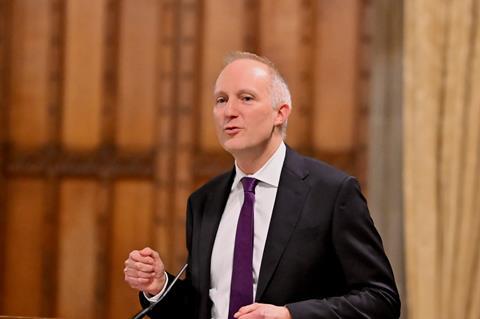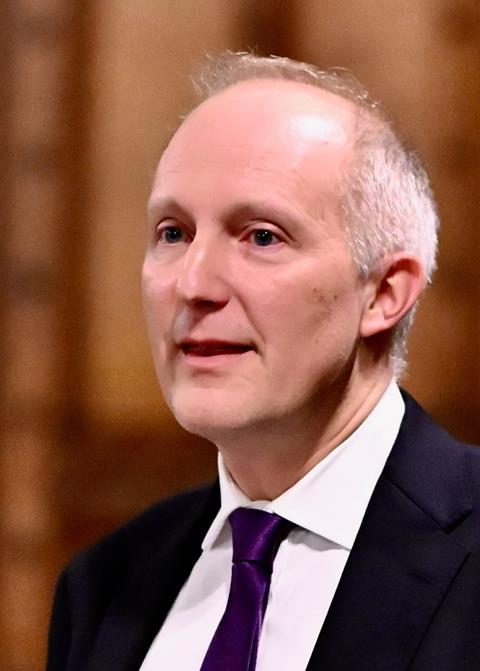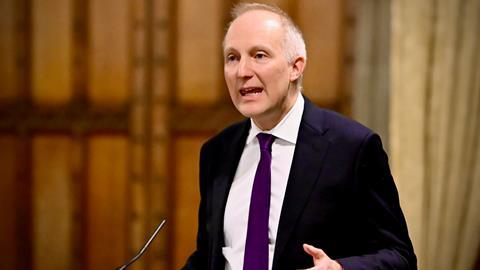New Bar Council chair Sam Townend opens up to Eduardo Reyes about diversity and an existential crisis for criminal justice
Born
Hackney, London
Education
Latymer School, Enfield
History degree, Trinity College Cambridge (1996)
Diploma in Law, City University (1998)
Roles
Barrister (call 1999, Lincoln’s Inn; Northern Ireland 2014)
Keating Chambers (1999-present; silk 2021)
Known for
Bar Council chair (2024)
As we begin this interview, I reflect that the first Bar Council chair I met was Dan Brennan in 1999 – at 81, still an active Labour member of the Lords. Sam Townend KC, though, is the first bar chair who is younger than me.
As I learned from his inaugural address two days earlier, we have certain things in common. State-school students who won a place at Cambridge to study history in the 1990s, maintenance and tuition paid for by a local authority; politically involved students who love music; and both with an interest in seeing the profession deliver on its stated aim of doing better on the diversity, and by extension the excellence, of its intake and progression. So it is a conversation I look forward to. Though as I later joke with colleagues, maybe this is how the world ends – with two Oxbridge graduates discussing social mobility.
There is a reason to start with Townend’s student experience. Long before the bar began to look in earnest at whether its intake could better reflect society, the University of Cambridge, its colleges and its student bodies were grappling with similar questions – and identifying similar obstacles.
Each have peculiar etiquettes and histories that can intimidate. Townend recalls ‘a big jump… quite substantial’ from the culture of school to that of the university, which he recalls as just 50% state school at the time. ‘Something to get used to,’ he reflects. Did he just take to it? ‘No, I mean, I think you have to deal with it, don’t you?’
But there were incentives. ‘What I enjoyed about university was that there was such a variety of people and such an array of things to get involved in. So I did get involved in the students’ union, and in the second year did drama. I sang in a chapel choir for a couple of years. Socially, it was terrific really,’ he says. ‘The work suffered a bit in my second year, but I managed to claw it back and got a 2:1.’
Townend accepts comparisons with the bar: ‘The Inns are, in some ways, analogous to the colleges. You’ve got the high table. You’ve got formal dining.’ Behind him, under a dull winter sky, is a view of Lincoln’s Inn, with its lawns, squares, hall and chapel.
The challenge, perhaps, is to make these things seem an attractive prize, rather than an awe-inspiring deterrent. In service of that aim, Townend notes, there is no longer a ‘requirement to eat a certain number of dinners’ in hall to qualify.
'The leadership group at the Bar Council is really representative… I think that’s a pretty good example to set and shows that the bar is changing'
Efforts with a harder edge, he says, include the bar’s participation in the 10,000 Black Interns project, taking 30 interns in the last round. ‘There are many other initiatives that introduce what life as a barrister is like,’ he says. ‘The so-called outreach work. It’s paying dividends, at pupillage and entry level, with the gender and race composition reflective of that cohort of the population as a whole. [That] is what you would expect to see if the bar was a meritocracy.’
He urges aspiring barristers to join an Inn. ‘The Inns play a very good role in supporting students of merit but not means through bar school… it doesn’t cost very much to join an Inn,’ he says. Townend speaks from personal experience, as he received financial support and help with accommodation.
There is ‘no single magic bullet’, but he points out: ‘The leadership group at the Bar Council is really representative, with Barbara Mills KC, who will be the first person of colour to chair the Bar Council next year. We’ve got Amrit Dhanoa, the chair of the Young Bar Committee, and Lorinda Long, an employed barrister, as treasurer. I think that’s a pretty good example to set and shows that the bar is changing.’
Yet, establishing the bar’s record on one measure has proved difficult – its state/private school mix. When the Bar Standards Board surveyed members in 2019, more than half refused to say whether they had been to a fee-paying school. A third of those who did answer had attended a fee-paying school, compared with 7% of the general population.
Then there are the gender pay gap findings. The Bar Council’s own research last year exposed a gender pay gap at the self-employed bar for all years of call and in all practice areas. Women silks get paid 71% of male colleagues’ median earnings.
Townend notes the figures for a state/private split are now known for everyone at the point of entry. Some 35% are privately educated, he notes, but he says the proper comparison with the wider population might be with the split for those taking A-levels at a fee-paying school – 18% – as opposed to the school population in general.
He also supports moves to change the timing of ‘call’, the designation which confirms someone has completed the vocational stage of training. There is a profession-wide interest in doing this, as many who are called have no intention of practising in England and Wales. This means those who do practise pay for the regulation of non-practising colleagues.
But Townend also knows that the current timing of call makes the prospects for success at the bar appear attritional. Just one in six called secure a pupillage, whereas: ‘Of those who truly intend to practise, it’s probably one in two. If the bar’s to get the brightest and the best from whatever background, it would be good if those statistics were honest and reflected both true intention and true ability.’
This signals continued support for a position outlined by his immediate predecessor, Nick Vineall KC, who argued that the title ‘barrister’ should only be conferred on completion of pupillage.
As a closing point on social mobility, Townend points to the use by a growing number of chambers (his own, Keating Chambers, included), of a contextual recruitment tool provided by Rare. This considers a much wider range of information than a simple state/private split.
The gender pay gap findings, Townend concedes, are ‘shocking’. The Bar Council is working with the Young Barristers’ Committee ‘to look in particular at the cohort from 0-3 years call’. I ask whether the clerking system might be a factor, but he will not be drawn, replying: ‘We definitely won’t rule out anything, but equally I don’t want to start throwing blame around without us having examined [this] with great care.’

Resilience
In common with the solicitor profession, the bar proved robust through the challenges of Covid-19. ‘There is significant resilience and flexibility among the profession,’ Townend says. ‘The bar was, I have to say, led by the judiciary and their willingness to be more flexible in how they dealt with hearings, and in particular remote hearings.’
But, he stresses, a high price was paid by the criminal bar: ‘There were dire impacts on particularly the criminal bar and those that practise in the Crown court. They didn’t have any work for five months and they had no earnings for that period.’
There is a longer-term problem at the criminal bar. It has an ageing demographic and, because of well-publicised challenges in working conditions and pay, has seen many barristers switch to other work.
In October 2022, criminal bar members voted to accept a 15% fee increase, ending an unprecedented period of strike action. But more is needed to repair the criminal bar, starting with support for entrants.
'We are at the point of structural failure and the need is both great and urgent… We looked at it and worked out that £2.5bn would change the justice system back to full working order'
In his inaugural address, Townend noted that the profession presently, ‘through generous support of the Inns of Court, supports 33 match-funded additional pupillages’. He urged government support to complement that commitment. ‘The government could help with this. May I take the opportunity to suggest an eye-catching manifesto commitment to match-funding 100 additional criminal pupillages, perhaps badged as up to 500 new prosecutors in five years, at a cost of no more than £1.5m a year.’
But if the political parties are planning manifesto spending commitments on the justice system, they are not saying so yet.
‘We are at the point of structural failure and the need is both great and urgent,’ says Townend. He notes that fixing the sector’s problems would be a modest commitment in the context of public spending. ‘We looked at it and worked out that £2.5bn would change the system back to full working order.’
There are areas, such as housing disrepair cases, where politicians are proposing bespoke solutions to delays, such as a special court. But it would be easier, Townend points out, ‘to just bring the system back into good order by resourcing it properly. The cry for a specialist court is actually just a cry for more resources to get the backlogs down’.

What he and Bar Council colleagues do have is a cohort of senior law officers who seem willing to stand up for lawyers and the judiciary when they face criticism from politicians and the press. ‘What I am pleased about,’ Townend says, ‘is that they are open to having that relationship. It hasn’t always been the case that incumbents in those positions had their focus on the professions or… they perhaps had wider roles.’ (He praises the current shadow justice team in similar terms.)
Where there is no public money involved, the Bar Council has achieved some public policy success to add to that 15% rise for the criminal bar. A commercial silk who has specialised in construction and engineering disputes, Townend has used his two-year run-in to the chair’s role to promote access to justice for SMEs.
An important win is in the area of fixed recoverable costs. ‘I’ve long had a focus on the civil justice side in relation to smaller-value cases and the fixed recoverable costs component,’ he explains. At issue was a stubborn resistance from government to unfreeze the recoverable fee for counsel in such disputes. It has, he says, affected the ability of barristers at the start of their careers to make a viable income from such cases, thereby also depriving business owners of legal support in disputes.
The Bar Council had threatened legal action against the government. But now, ‘it looks like we’re going to have a real further improvement in the fixed advocacy fee’, Townend says. ‘The government’s due to issue its statutory instrument and from what the lord chancellor and the ministry have said publicly, they’re going to increase it further by inflation for the first three quarters of last year. In addition, there was a gap between 2013 and 2016 when they hadn’t increased it, so they’re proposing at least in their consultation paper to put up another 4% in that regard. What that will mean is the more modest value brief on a fast track prior to October last year was £500, unchanged for over a decade. That will go up to £620.’
Our discussion inevitably focuses most closely on the problems that barristers look to the Bar Council to try and fix – or issues such as diversity, where the bar has come in for criticism. But we end on a positive note, with Townend relating some of what he loves in his professional practice: ‘My favourite part of the job is cross-examination of experts. I really enjoy doing it. It’s the mastery of the specialism for that moment in time but also this starting position, that the only witnesses giving evidence were paid to give their evidence which starts them from a tricky position… I like that.’
The Bar Council’s annual conference, wrongly reported as defunct after a pause in 2023, will be held on 8 June in London, with an evening drinks reception on 7 June





































1 Reader's comment